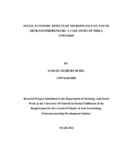| dc.contributor.author | Muhia, Samuel M | |
| dc.date.accessioned | 2014-12-09T07:58:08Z | |
| dc.date.available | 2014-12-09T07:58:08Z | |
| dc.date.issued | 2014 | |
| dc.identifier.citation | Master of Arts in Sociology (Entrepreneurship Development Option),2014 | en_US |
| dc.identifier.uri | http://hdl.handle.net/11295/76802 | |
| dc.description.abstract | The study focused on the Social Economic effects that Micro finance has on youth Micro entrepreneurs. Specifically, the research aimed at establishing the effects on individual livelihoods, the effects on the performance and sustainability of micro enterprises and the effects of training on youth micro enterprises. The study was conducted in Thika Township in Kiambu County among youth micro entrepreneurs. A sample of sixty one (61) respondents who were youths operating micro enterprise businesses within the township were interviewed. The key informants included four (4) business development officers from K-rep bank. For the Youth Micro entrepreneurs, questionnaires with open and closed ended questions were administered through face to face interviews and for the key informants an interview guide was used. The data was analyzed by use of statistical package for social scientists (SPSS) .The study findings indicated that majority of youth micro entrepreneurs had positively improved their lives and that of their businesses due to the loans and other services granted to them and micro finance had also positively improved the knowledge and management skills of the business owners due to the training programs. Results further noted that the businesses improved positively in terms of expansion, high sales and increased profits. This was revealed by the increase of number of employees and improved family living standards to the youth after the consumption of micro finance products. The study also found out that some youth micro entrepreneurs experienced very little or no positive change after consumption of micro finance as indicated by their responses on business performance and livelihood standards. The study concludes that credit alone cannot serve youth and take them fully out of poverty; this is only one of the many elements on a menu of possible interventions to generate income and possibly alleviate poverty. The study recommends that more campaigns be conducted by micro finance providers to make as many youth aware of their products and services. | en_US |
| dc.language.iso | en | en_US |
| dc.publisher | University of Narobi | en_US |
| dc.title | Social economic effects of micro finance on youth micro entrepreneurs: a case study of Thika township | en_US |
| dc.type | Thesis | en_US |
| dc.type.material | en_US | en_US |

